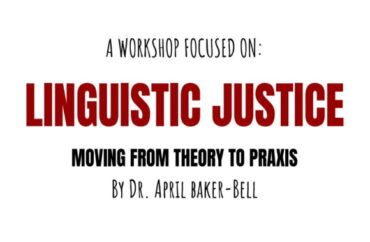
Black students should not be penalized for using “Black Language” and college courses should critically interrogate “white linguistic hegemony and anti-Black linguistic racism,” said a scholar who gave a presentation recently at Northern Illinois University.
“People’s language experiences are not separate from their racial experiences,” the University of Michigan’s April Baker-Bell told an online audience during a November workshop for faculty and graduate students at Northern Illinois University.
The way black language is “devalued in classrooms reflects how Black lives are devalued in the world,” she told attendees. “Similarly, the way we think about this notion of standard mainstream English is directly connected to the invisible way that White culture is often deemed normal, neutral, and superior in the world.”
Best known for her book “Linguistic Justice: Black Language, Literacy, Identity, and Pedagogy,” Baker-Bell is an associate professor of language, culture, and justice in education, and was one of six professors who co-authored a 2020 document calling to abolish “White Mainstream English.”
According to Baker-Bell, when educators require black students to compose their written assignments using what is generally considered standard or mainstream English, they are committing acts of “Anti-Black Linguistic Racism,” defined by Baker-Bell in a linguistic justice workbook she distributed to workshop attendees as “the linguistic violence, persecution, dehumanization, and marginalization that Black Language-speakers experience in schools and in everyday life.”
Baker-Bell did not respond to an email from The College Fix inquiring whether she believes it is ever appropriate for professors to insist students use standard English or if she believes doing so is always an inherent act of bigotry.
At the workshop, which was co-sponsored by NIU’s English Graduate Student Association, College of Liberal Arts and Sciences, and Faculty Academy on Cultural Competence and Equity, Baker-Bell spent roughly 30 minutes lecturing about the historical roots of black language in slavery, made the argument that black English syntactically qualifies as its own language, and discussed different pedagogical approaches to black English speakers, prior to distributing the workbook.
The first half of the workbook provided participants with multiple exercises to give them the “opportunity to think through how [they] might be complicit in the reproduction of anti-Black racism and anti-Black linguistic racism through curricula, language instruction, pedagogies, practices, and language policies,” as well as how they can “move toward an antiracist approach to language pedagogy.”
The workbook also covered how educators could incorporate linguistic justice into standard writing courses before going on to present a model for a dedicated linguistic justice course.
Goals of the proposed course center around helping students develop their “linguistic consciousness,” understand the historical and cultural context of black language, “write for linguistic justice,” and critically interrogate “white linguistic hegemony and anti-Black linguistic racism.”
Suggested assignments for the model linguistic justice course include a TikTok or digital animation project on how white linguistic hegemony, anti-black linguistic racism, or black linguistic appropriation are perpetuated by the media.
The Saturday Night Live sketch “Gen Z Hospital,” which featured guest-host Elon Musk, was highlighted by Baker-Bell during the workshop as an especially well-known but generally overlooked example of black linguistic appropriation. In the sketch, Musk plays a doctor who has to deliver “cringe” news to a group of Gen-Z adults that their work-mom, Bestie, is “literally dead, like dead-dead.”
Another proposed assignment in the workbook is a “Linguistic Justice Action Project” to spur students to “dismantle white linguistic hegemony and Anti-Black Linguistic Racism.”
Possible options for completing the assignment include a social media campaign or YouTube-based public service announcement promoting linguistic justice, the facilitation of a town hall on anti-black linguistic racism, the creation of a children’s book to teach kids about linguistic justice, and writing letters to one’s governor or state commissioners of education concerning “linguistic racism and how it is embedded in standardized curricula, tests, and language standards.”
During a Q&A session at the end of the workshop, multiple attendees voiced support for eliminating course policies that penalize students who use alternative forms of English and sought advice for phasing out such policies campus-wide.
Some of Baker-Bell’s recommendations included consciousness raising and additional trainings.
The College Fix contacted the chair of NIU’s Department of English, Scott Balcerzak, via email, asking what his thoughts were on the topic of linguistic justice, as well as whether his department has any policies in place at the departmental level requiring the of use standard English by students when completing assignments for English courses or prohibiting professors from penalizing students who use alternative forms of English on such assignments.
Balcerzak did not respond.
MORE: ‘Black linguistic justice’: Professors demand end to standard English as the norm
Like The College Fix on Facebook / Follow us on Twitter






Please join the conversation about our stories on Facebook, Twitter, Instagram, Reddit, MeWe, Rumble, Gab, Minds and Gettr.